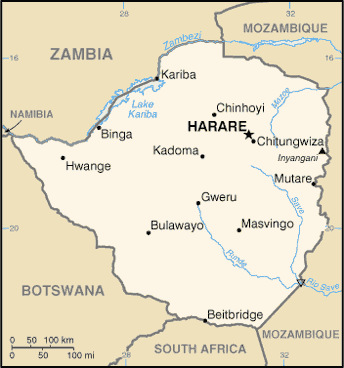 |
usa | world | animals | vocabulary | health | science | math | history |
Zimbabwe
Map Courtesy CIA World Factbook
Iron Age Bantu-speaking peoples began migrating into the area about 2,000 years ago, including the ancestors of the Shona, who account for roughly four fifths of the country's population today. Ruins at Great Zimbabwe, a Shona-speaking state, attest the existence of a medieval Bantu civilization in the region. Linked to the establishment of trade ties with Muslim merchants on the Indian Ocean coast around the early 10th century, Great Zimbabwe began to develop in the 11th century. The state traded gold, ivory, and copper for cloth and glass. It ceased to be the leading Shona state in the mid-15th century. In 1888 British imperialist Cecil Rhodes extracted mining rights from king Lobengula of the Ndebele. In 1889 Rhodes obtained a charter for the British South Africa Company, which conquered the Ndebele and their territory (named "Rhodesia" in 1895 after Cecil Rhodes) and promoted the colonization of the region and its land, labor, and precious metal and mineral resources. Both the Ndebele and the Shona staged unsuccessful revolts against white colonialist encroachment on their native lands in 1896-1897. In response, Ian Smith's government made a unilateral declaration of independence on November 11, 1965. The United Kingdom called the declaration an act of rebellion but did not reestablish control by force. When negotiations in 1966 and 1968 proved fruitless, the UK requested UN economic sanctions against Rhodesia. In an attempt to distance the country from its colonial master, Smith declared Rhodesia a republic in 1970, but this did not result in international recognition. As guerrilla activities fighting minority rule intensified, the Smith regime opened negotiations with the leaders of the Zimbabwe African National Union (ZANU), led by Robert Mugabe after the assassination of Herbert Chitepo in Zambia in 1975, and the Zimbabwe African People's Union (ZAPU), led by Joshua Nkomo. With his regime near the brink of collapse, Smith in March 1978 signed a desperate accord with three black leaders who offered safeguards for whites headed by Bishop Abel Muzorewa. Muzorewa, who not only had the support of Smith but with the white-minority regime in South Africa as well, lacked credibility among significant sectors of the African population. The Muzorewa government soon faltered. In 1979 the British Government asked all parties to come to Lancaster House in an attempt to negotiate a settlement in the civil war. Following the conference, held in London (1979-1980), Britain's Lord Soames was appointed governor to oversee the disarming of revolutionary guerrillas, the holding of elections, and the granting of independence to an uneasy coalition government with Joshua Nkomo, head of Zimbabwe African People's Union. In the free elections of February 1980, Mugabe and his Zimbabwe African National Union (ZANU) won a landslide victory. Mugabe has won reelection ever since. The drought in southern Africa, perhaps the worst of the century, affected Zimbabwe so severely that a national disaster was declared in 1992. The drought compounded the country's debt crisis, and the ensuing IMF-backed economic adjustment and austerity program caused further widespread hardship. Despite majority rule, whites made up less than 1% of the population but held 70% of the country's commercially viable arable land, of which 80% had been purchased legally since independence in 1980. However whites held no political power. Land redistribution from whites reemerged as the political issue beginning in 1999. In the aftermath of Mugabe's handling of the land crisis, which moved to redistribute land to blacks, Zimbabwe was suspended from the Commonwealth of Nations on charges of human rights abuses and of election tampering in 2002. Later, Zimbabwe withdrew from the Commonwealth. The seizure of the white-owned commercial farms led to starvation on a wide scale. The UN has recently estimated that 34% of the population has HIV/AIDS, probably the highest in the world, compared to about 0.65% average in the world. Following elections in 2005, the Government initiated Operation Restore Order in a supposed effort to crackdown on illegal markets and homes. This action has been widely condemned by opposition and international figures.
|
|||||||
 The Republic of Zimbabwe is a country located in the southern part of the continent of Africa, between the Zambezi and Limpopo rivers. It is bordered by South Africa to the south, Botswana to the west, Zambia to the north and Mozambique to the east.
The Republic of Zimbabwe is a country located in the southern part of the continent of Africa, between the Zambezi and Limpopo rivers. It is bordered by South Africa to the south, Botswana to the west, Zambia to the north and Mozambique to the east.